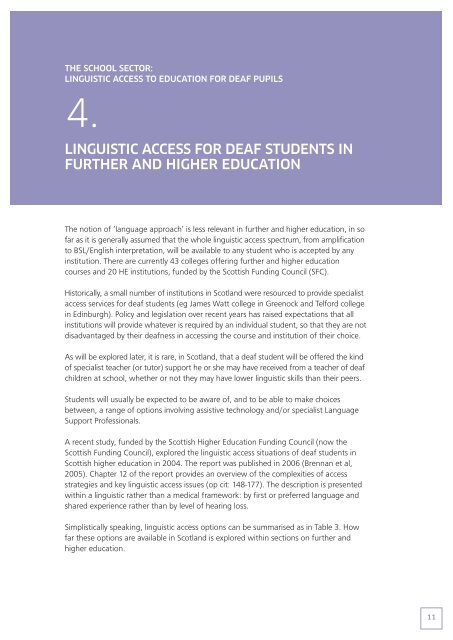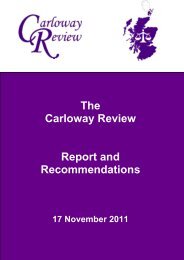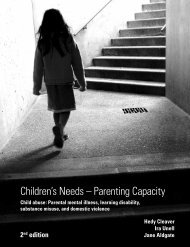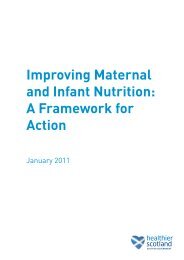British Sign Language and Linguistic Access Working Group ...
British Sign Language and Linguistic Access Working Group ...
British Sign Language and Linguistic Access Working Group ...
Create successful ePaper yourself
Turn your PDF publications into a flip-book with our unique Google optimized e-Paper software.
THE SCHOOL SECTOR:LINGUISTIC ACCESS TO EDUCATION FOR DEAF PUPILS4.LINGUISTIC ACCESS FOR DEAF STUDENTS INFURTHER AND HIGHER EDUCATIONThe notion of ‘language approach’ is less relevant in further <strong>and</strong> higher education, in sofar as it is generally assumed that the whole linguistic access spectrum, from amplificationto BSL/English interpretation, will be available to any student who is accepted by anyinstitution. There are currently 43 colleges offering further <strong>and</strong> higher educationcourses <strong>and</strong> 20 HE institutions, funded by the Scottish Funding Council (SFC).Historically, a small number of institutions in Scotl<strong>and</strong> were resourced to provide specialistaccess services for deaf students (eg James Watt college in Greenock <strong>and</strong> Telford collegein Edinburgh). Policy <strong>and</strong> legislation over recent years has raised expectations that allinstitutions will provide whatever is required by an individual student, so that they are notdisadvantaged by their deafness in accessing the course <strong>and</strong> institution of their choice.As will be explored later, it is rare, in Scotl<strong>and</strong>, that a deaf student will be offered the kindof specialist teacher (or tutor) support he or she may have received from a teacher of deafchildren at school, whether or not they may have lower linguistic skills than their peers.Students will usually be expected to be aware of, <strong>and</strong> to be able to make choicesbetween, a range of options involving assistive technology <strong>and</strong>/or specialist <strong>Language</strong>Support Professionals.A recent study, funded by the Scottish Higher Education Funding Council (now theScottish Funding Council), explored the linguistic access situations of deaf students inScottish higher education in 2004. The report was published in 2006 (Brennan et al,2005). Chapter 12 of the report provides an overview of the complexities of accessstrategies <strong>and</strong> key linguistic access issues (op cit: 148-177). The description is presentedwithin a linguistic rather than a medical framework: by first or preferred language <strong>and</strong>shared experience rather than by level of hearing loss.Simplistically speaking, linguistic access options can be summarised as in Table 3. Howfar these options are available in Scotl<strong>and</strong> is explored within sections on further <strong>and</strong>higher education.11
















